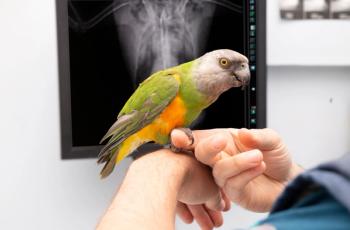
An Interview with... Dr. Stephen J. Withrow
A limb-sparing technique to treat osteosarcoma is just one of many contributions this oncologist, inspired by his patients, has given both veterinary and human medicine. "Cancer patients face their disease with dignity and grace and put their faith in our hands."
Stephen J. Withrow, DVM, DACVS, DACVIM (oncology), is the director of Colorado StateUniversity's Robert H. and Mary G. Flint Animal Cancer Center, which he helped establish. He has been recognized with theGaines award twice, the Bonfils-Stanton Foundation Award, and Colorado State University's University Distinguished Professor award.
What is the most exciting change you've seen in veterinary medicine?
Board certification and the development of specialization. This has resulted in improved patient care, but it is important to avoid getting tunnel vision and to remember where we came from and the big picture of our profession.
Who was your most memorable patient?
Bart the Bear. Bart was 10 ft tall and weighed 1,400 lb. He had a football-size cancer on his wrist, which we successfully treated with surgery, radiation, and chemotherapy. Anesthesia, transport, bleeding control, and recovery were exciting!
Who inspired you most in your career?
The cancer patients that face their disease with dignity and grace and put their faith in our hands.
What was the best professional advice you ever received?
In 1975, Dr. Martin De Angelis at the Animal Medical Center in New York City asked me, "I don't understand why, but if you like oncology so much why you don't make a career of it?"
What would you advise a new graduate?
Have fun, and try not to get bogged down in the minutia. Give 100% effort. Take pride in the profession. Retain your integrity, compassion, vision, and a dogged determination to do the right thing and see things to completion.
What would you have liked to do if you hadn't become a veterinarian?
Anything outdoors and using my hands—farming and ranching would have been fun. Fundraising and meeting caring people who believe in the Sky High Hope Camp have been surprisingly rewarding and are a second career.
Describe your work with Sky High Hope Camp for which you were awarded the Ronald McDonald House Volunteer of the Year award in 2003.
This is a week-long outdoor experience in the Rocky Mountain area for children aged 8 to 16 affected by cancer. I have been a volunteer counselor for more than 20 years. I find the experience inspirational, and it reinforces the value of my and my colleagues' work in comparative oncology.
Are you a cat person or a dog person?
Dog person. I have always hunted with Labradors.
What book would you recommend and why?
Pretty Good Joke Book by A Prairie Home Companion and Garrison Keillor. Anytime I need a good laugh, I read a few pages.
What is your favorite film?
Cool Hand Luke. Because of the lesson imparted in the line, "What we've got here is failure to communicate."
What part of your work do you enjoy most?
Clinical service because of the great clients and animals we are privileged to help. I also enjoy translational research, surgery, and student-resident-fellow education.
What do you consider the greatest threat to the profession?
Chasing the almighty dollar!
Which animal health needs are currently unmet?
Overpopulation, behavior as a cause of euthanasia and abandonment, geriatric care, and animal hospice.
What changes in veterinary medicine do you hope will occur in the next 100 years?
The recent unraveling of the canine genome should open tremendous opportunities in identifying disease causation, prevention, and treatment. Molecular biology will allow us more and more insights into disease that could translate to the clinic. Predictive assays for diagnosis and guidance of therapy decisions will result in decreased treatment-related side effects and increased efficacy. And I hope we can get universal health insurance for people and pets to take away the decisions dictated by dollars.
Newsletter
From exam room tips to practice management insights, get trusted veterinary news delivered straight to your inbox—subscribe to dvm360.




